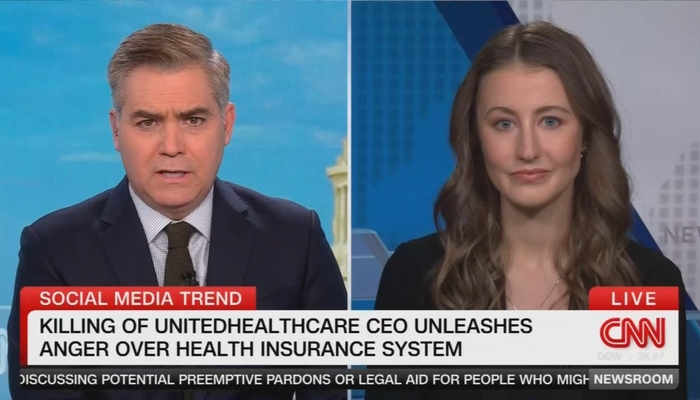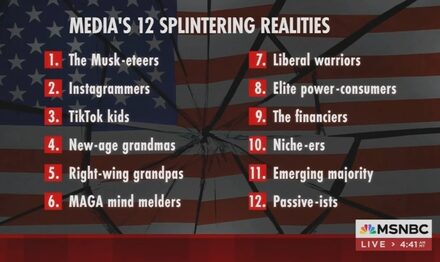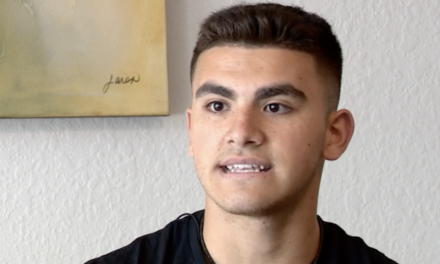We support our Publishers and Content Creators. You can view this story on their website by CLICKING HERE.

If a group of conservatives took to social media to dance on the grave of someone who was recently murdered, CNN Newsroom host Jim Acosta would fiercely and unequivocally condemn them, and rightfully so. He certainly would not hype how “an entire discussion” had been raised in the aftermath of their murder, but that is exactly what he did on Friday after United Healthcare CEO Brian Thompson’s recent murder.
After a montage of social media clips of such grave dancing, Acosta welcomed correspondent Clare Duffy by claiming, “Those posts are part of a growing online trend of Americans expressing their personal struggles with UnitedHealthcare insurance following the CEO’s death.”
Thompson didn’t just die; he was murdered. As it was, Acosta wondered, “Clare, a lot of outrage over denied insurance claims, and it’s just sparked an entire discussion on social media. How big of a problem is this?”
Duffy began, “Yes. Jim, look, I mean, obviously there is never a justification for this kind of violence. But I think what we’re seeing in the social media reaction is this pent-up frustration and anger and distrust that so many Americans feel over the health insurance industry.”
A proper pair of journalists would look at these people and first ask if they have no shame and second ask if they are aware that government-run “universal” healthcare systems deny treatment all the time. Instead, Duffy continued:
And it is a big problem. I mean, look, we’ve spoke with healthcare experts who say this is a thing that often—these healthcare claim denials are a thing that often causes people anxiety and frustration. And it’s a really common problem. More than half of Americans, 58 percent say that they have experienced some kind of problem with their health insurance over the past year, including denial of claims, preauthorization issues, those kinds of things. And of that 58 percent, 15 percent of those respondents say that it actually caused problems with their health anxiety or delays in the treatment that they received, and so this is an ongoing problem, but I think we’re seeing that really bubble up to the surface in the wake of this news.
Later Acosta welcomed “former health insurance industry executive turned whistleblower and the president for the Center for Health and Democracy” Wendell Potter and recalled:
You testified in front of Congress in 2009, talked about how insurance companies were routinely canceling the coverage of policyholders who got sick. You and I got to know each other a little bit during that run-up to the passage of Obamacare. And I guess what goes through your mind when you hear some of these stories today in light of the fact that, I mean, the discussion during the passage of Obamacare, the signing of Obamacare, was that that legislation, the ACA, was supposed to fix a lot of these problems, apparently not.
After hyping Obamacare brining “a lot of people into coverage,” Potter added, “what we heard this morning, what we’ve been hearing over the past several days, is this pent up frustration.”
Potter also claimed that “it’s notable that this occurred in New York City. This tragic murder was just before Investor Day for this big company. And the point I’m making here is that shareholders and Wall Street financial analysts are the most important stakeholder for that company and others… the way that these companies satisfy those investors is by restricting access to care and that’s why they’re using A.I. to deny access and why we’re seeing so many people now not getting the care that they need, not getting medically necessary care that they need in this.”
Again, governments, who have no investors or profit motives, deny healthcare treatments on a regular basis, so if CNN really wants to have a conversation about claim denials in the aftermath of Thompson’s murder, they should have an actual conversation and not a left-wing, anti-capitalism talking points regurgitation session.
Here is a transcript for the December 6 show:
CNN Newsroom with Jim Acosta
12/6/2024
10:06 AM ET
JIM ACOSTA: Those posts are part of a growing online trend of Americans expressing their personal struggles with UnitedHealthcare insurance following the CEO’s death.
CNN’s Clare Duffy joins me now. Clare, a lot of outrage over denied insurance claims, and it’s just sparked an entire discussion on social media. How big of a problem is this?
CLARE DUFFY: Yes. Jim, look, I mean, obviously there is never a justification for this kind of violence. But I think what we’re seeing in the social media reaction is this pent-up frustration and anger and distrust that so many Americans feel over the health insurance industry.
And it is a big problem. I mean, look, we’ve spoke with healthcare experts who say this is a thing that often — these healthcare claim denials are a thing that often causes people anxiety and frustration. And it’s a really common problem. More than half of Americans, 58 percent say that they have experienced some kind of problem with their health insurance over the past year, including denial of claims, preauthorization issues, those kinds of things. And of that 58 percent, 15 percent of those respondents say that it actually caused problems with their health anxiety or delays in the treatment that they received, and so this is an ongoing problem, but I think we’re seeing that really bubble up to the surface in the wake of this news.
…
ACOSTA: Joining me now is Wendell Potter, a former health insurance industry executive turned whistleblower and the president for the Center for Health and Democracy.
Wendell, you testified in front of Congress in 2009, talked about how insurance companies were routinely canceling the coverage of policyholders who got sick. You and I got to know each other a little bit during that run-up to the passage of Obamacare. And I guess what goes through your mind when you hear some of these stories today in light of the fact that, I mean, the discussion during the passage of Obamacare, the signing of Obamacare, was that that legislation, the ACA, was supposed to fix a lot of these problems, apparently not.
WENDELL POTTER: It was. And a big problem then, as you recall, was we had about 50 million Americans who didn’t have health insurance. And this was, this did, that law did bring a lot of people into coverage. But what we’re seeing now is that people who have coverage are not able to get the care that they need and that has become the big problem here. And what we heard this morning, what we’ve been hearing over the past several days, is this pent-up frustration.
And it’s notable that this occurred in New York City. This tragic murder was just before Investor Day for this big company. And the point I’m making here is that shareholders and Wall Street financial analysts are the most important stakeholder for that company and others. I used to plan sickness investor days. And the way that these companies satisfy those investors is by restricting access to care and that’s why they’re using A.I. to deny access and why we’re seeing so many people now not getting the care that they need, not getting medically necessary care that they need in this.
ACOSTA: And I remember, Wendell, you were exposing a lot of this at the time in the late 2000s, early 2010s, as a whistleblower in the industry.

 Conservative
Conservative  Search
Search Trending
Trending Current News
Current News 





